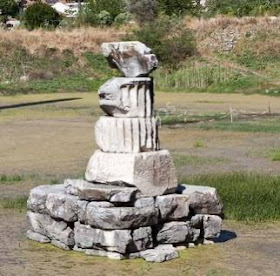THE TEMPLE OF ARTEMIS IN EPHESUS, ONE OF THE SEVEN (7) WONDERS OF ANCIENT TIMES.
 |
The Temple of Artemis in Ephesus , the largest temple of the Hellenic world. |
The temple of Artemis in Ephesus, one of the seven (7) wonders of ancient times, was entirely destroyed in 401 A.D by John of Antioch from Syria, also known to us as....Saint John Chrysostom.
Around the 8th century B.C, Ephesus became the financial centre of Asia Minor and obtained legendary wealth. It was the biggest city of Ionia and it always had a good relationship with the countries of the East because their trade activities depended on its harbour. The city of Ephesus was dedicated to the goddess Artemis. Initially, the city had a small temple which was destroyed later so the the magnificent "Artemision" could be built, which came to be known as "The Temple of Artemis" in Ephesus, one of the seven wonders of ancient times. Its construction began by the King of Lydia, Croesus and it was completed after 120 years. It was the largest building in Ionia. The sacred Temple of Artemis was served by virgin priests and priestesses (Hiereiai), named "Megabyzoi". Τhe temple was constructed according to the Ionic order and it was designed by the Hellene architect Chersifronos. It was orthogonal, akin to temples of its era. However, in contrast to others temples, the Artemision was entirely constructed with marble. Marble steps cradled the temple's base and they admitted to a higher level. The facade was decorated and it had a view of a spacious courtyard. Not only was it known as the most beautiful temple of Hellenic times, but it was also one of the largest temples of classical antiquity. The temple was 133 metres in length and 73 metres in width. It was more than twice the size of the Parthenon in Athens (the Parthenon is 69.54 metres in length and 30.87 in width). Its columns were 20 metres high, also built according to Ionic order, with circular sides. In total, there were 127 columns in orthogonal alignment on the entire base.
 |
| The statue of Artemis in Ephesus. |
The sanctum was being visited for centuries by traders and pilgrims who offered splendid oblation to the goddess. Antipater of Sidon who chose and defined the number of the seven (7) wonders of ancient times, stated: "The magnificence of the Artemision exceeded the remainder monuments - except for Olympus. The sun did not seem so majestic anywhere else than in Artemision".
On the night of 21st July 356 B.C, the temple was destroyed by a blaze which was laid by the paranoic Herostratus of Ephesus because he wanted to immortalize his name in history. According to tradition, Alexander the Great was born that night. The historian Plutarch (50 - 120 A.D) wrote later that the goddess Artemis was so busy due to the birth of Alexander the Great, that she could not go to Ephesus and protect her temple. The temple was reconstructed by Alexander the Great but it was destroyed again by the Goths in 262 A.D. The Ephesians built a new and magnificent temple with the aid of citizens around Asia Minor. When the apostle Paul visited Ephesus in order to preach Christianity around the 1st century A.D, he came up against Ephesus's residents who remained loyal to Artemis.
After the domination of the "religion of love" in 401 A.D, the anti-Hellene John of Antioch, commonly known as ''Chrysostom'', the patriarch of Constantinople announced that he would not tolerate that symbol of the Hellenic Gods any longer. He raised money from rich fanatic christian families and he paid workers, with the aid of batter-armed monks as well as a mob of fanatic Christians, he ordered the burning and foundational destruction of the temple, one of the seven (7) wonders of ancient times. The artworks and the marble that remained were transported to Thessaloniki and Constantinople in order to become building materials for various christian monuments. Theodoret (393-457 AD), ecclesiastic writer and christian bishop states: "He gathered barbarian fanatic christians and monks and destroyed the wonderful piece of art". A century later, above the debris of Artemision, a byzantine royal church was built dedicated to Holy Mary (Mother of Jesus), which exists until today.
 |
| Syrian anti-Hellene Ioannis Antioheas who is known as St. Ioannis Chrysostomos. |
Later, the city of Ephesus was abandoned and digging started only in the late 19th century. Today there are only ruins of Ephesus and a renovated chapiter from Artemision.
 |
| A renovated chapiter from Artemision which was one of the seven (7) wonders of ancient times. |
TRANSLATED BY: MARIA ORMANI
SOURCE: https://www.e-synews.gr/wp/2018/10/20/o-naos-tis-artemidos-stin-efeso-ena-apo/
========================================================================

No comments:
Post a Comment